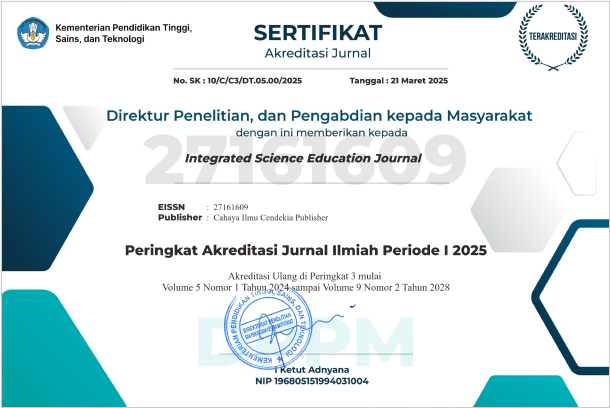Evaluation of Natural Science Subject Teachers as Improving the Quality of Student Learning at Madrasah Tsanawiyah
Abstract
Purpose of the study: The aim of this research is to evaluate the performance of Natural Sciences teachers at MTs Nurul Huda in Muaro Jambi Regency.
Methodology: This research uses a descriptive qualitative approach. The sampling technique is the Purposive sampling technique. The sample in this research was the Natural Sciences teacher at MTs Nurul Huda in Muaro Jambi Regency. Data collection in this research was carried out using document analysis and interview techniques. Document analysis using document assessment sheets. The data analysis technique used is the Miles & Huberman technique.
Main Findings: Based on the results of interviews with MTs Nurul Huda Natural Sciences teachers in Muaro Jambi Regency, planning, implementation, and assessment were good. Likewise, attention from foundations and school principals should give full attention to teachers so that they can continue to develop their potential and improve their teaching performance.
Novelty/Originality of this study: This research can provide a more comprehensive and contextual view in evaluating teacher performance and efforts to improve the quality of learning at MTs Nurul Huda in Muaro Jambi Regency. This can also support updates in general teacher performance evaluation methods in the educational environment.
References
F. Juli., and A. Diah, “Penilaian kinerja guru ipa profesional (Studi kasus pada SMP di Kabupaten Aceh Besar) [Performance assessment of professional science teachers (Case study at middle school in Aceh Besar Regency)],” Jurnal Penelitian Pendidikan IPA (JPPIPA), vol. 5, no. 2, 2019, doi: 10.29303/jppipa.v5i2.236
K. K. Kondo., C. L. Damberg., A. Mendelson., M. Motu’apuaka., M. Freeman., M. O’Neil., and D. Kansagara, “Implementation processes and pay for performance in healthcare: A systematic review,” Journal of general internal medicine, vol. 31, pp. 61-69, 2016, doi: 10.1007/s11606-015-3567-0
D. Vasileiadou., and K. Karadimitriou, “Examining the impact of self-assessment with the use of rubrics on primary school students’ performance,” International Journal of Educational Research Open, vol. 2, pp. 100031, 2021, doi: 10.1016/j.ijedro.2021.100031
A. Mateos-Ronco., and J. M. Hernández-Mezquida, “Developing a performance management model for the implementation of TQM practices in public education centres,” Total Quality Management & Business Excellence, vol. 29, no. 5-6, pp. 546-579, doi: 10.1080/14783363.2016.1216309
M. L. Bernacki., M. M. Chavez., and P. M. Uesbeck, “Predicting achievement and providing support before STEM majors begin to fail,” Computers & Education, vol. 158, 103999, 2020, doi: 10.1016/j.compedu.2020.103999
S. N. Haizah, “Pengembangan Kualitas Pendidikan Di Indonesia Dilakukan Melalui Peningkatan Profesionalitas Guru[Development of the quality of education in Indonesia is carried out through increasing teacher professionalism],” Jurnal Penelitian, Pendidikan dan Pengajaran: JPPP, vol. 1, no.1, pp. 38-48, 2020, doi: 10.30596/jppp.v1i1.4454
Sudargini, Y., & Purwanto, A. (2020). The effect of teachers pedagogic competency on the learning outcomes of students. Journal of Industrial Engineering & Management Research, 1(4), 1-8, 2020, doi: 10.7777/jiemar.v1i4.96
Bellibaş, M. Ş., Gümüş, S., & Kılınç, A. Ç. (2020). Principals supporting teacher leadership: The effects of learning‐centred leadership on teacher leadership practices with the mediating role of teacher agency. European journal of education, 55(2), 200-216, 2020, doi: 10.1111/ejed.12387
Archambault, L., Leary, H., & Rice, K. (2022). Pillars of online pedagogy: A framework for teaching in online learning environments. Educational Psychologist, 57(3), 178-191, 2022, doi: 10.1080/00461520.2022.2051513
M. W. R. Handayani, “Faktor-faktor yang mempengaruhi kinerja guru ipa (sains) smp negeri se-kecamatan ngaglik kabupaten sleman[Factors that influence the performance of state junior high school science (science) teachers in Ngaglik sub-district, Sleman district],” Jurnal penelitian ilmu pendidikan, vol. 7, no. 2, 2014, doi: 10.21831/jpipfip.v7i2.4923
S. Sunhaji, “Kualitas Sumber Daya Manusia (Kualifikasi, Kompetensi Dan Sertifikasi Guru)[ Quality of Human Resources (Qualifications, Competencies and Teacher Certification)].” Jurnal Kependidikan, vol. 2, no. 1, pp. 142-160, 2014, doi: 10.24090/jk.v2i1.546
I. Engeness, “Developing teachers’ digital identity: towards the pedagogic design principles of digital environments to enhance students’ learning in the 21st century,” European Journal of Teacher Education, vol. 44, no. 1, pp. 96-114, 2021, doi: 10.1080/02619768.2020.1849129
R. Widarsih, and N. J. Faraz, “Evaluasi kinerja guru ips smp berdasarkan standar kompetensi guru di kabupaten Kebumen[Performance evaluation of middle school social studies teachers based on teacher competency standards in Kebumen Regency],” Harmoni Sosial : Jurnal Pendidikan IPS, vol. 3, no. 2, 2016, doi: 10.21067/jip.v10i2.4314
K. A. Parkes, "Performance assessment: Lessons from performers," International Journal of Teaching and Learning in Higher Education, vol.22, no. 1, pp. 98-106, 2010.
N. Nursa’ban., and S. S. Suparmini, “Evaluasi kompetensi pedagogik guru geografi SMA di Kabupaten Bantul[Evaluation of the pedagogical competence of high school geography teachers in Bantul Regency],” SOCIA: Jurnal Ilmu-Ilmu Sosial, vol. 9, no. 2, 2012, doi: 10.21831/socia.v11i02.3607
F. D. Guillén-Gámez., M. J. Mayorga-Fernández., J. Bravo-Agapito., and D. Escribano-Ortiz, “Analysis of teachers’ pedagogical digital competence: Identification of factors predicting their acquisition,” Technology, Knowledge and Learning, vol. 26, no. 3, pp. 481-498, 2021, doi: 10.1007/s10758-019-09432-7
C. Zhang, “From face-to-face to screen-to-screen: CFL teachers’ beliefs about digital teaching competence during the pandemic,” International Journal of Chinese Language Teaching, vol. 1, no. 1, pp. 35-52, 2020, doi: 10.46451/ijclt.2020.06.03
P. Colás-Bravo., J. Conde-Jiménez., and S. Reyes-de-Cózar, “Sustainability and digital teaching competence in higher education,” Sustainability, 13(22), 12354, 2021, doi: 10.3390/su132212354
P. A. Lumbantobing, “The contribution of lecturer pedagogical competence, intellectual intelligence and self-efficacy of student learning motivation,” Budapest International Research and Critics in Linguistics and Education (BirLE) Journal, vol. 3, no. 1, pp. 564-573, 2020, doi: 10.33258/birle.v3i1.852
R. M. Rusli, Merancang Penelitian Kualitatif Dasar/ Deskriptif dan Studi Kasus, Dinas Pendidikan Luwuh Timur, 2020.
A. Suharsimi, Metode peneltian, Jakarta: Rineka Cipta, 2010.
A. Kamaria, “Implementasi kebijakan penataan dan mutasi guru pegawai negeri sipil di lingkungan dinas pendidikan kabupaten Halmahera Utara[Implementation of the policy for structuring and transferring civil servant teachers within the North Halmahera district education office],” Jurnal Ilmiah Wahana Pendidikan, vol. 7, no. 2, 2021, doi: 10.5281/zenodo.4970644
A. Nurhaningtyas, and A. A. Pradana, “Implementation of Guided Inquiry Model with Multimedia to Improve Student Learning Outcomes of Class V MI,” Madrosatuna: Journal of Islamic Elementary School, vol. 5, no. 2, pp. 37-49, 2021, doi: 10.21070/madrosatuna.v5i2.1531
J. P. Papay., E. S. Taylor., J. H. Tyler., and M. E. Laski, “Learning job skills from colleagues at work: Evidence from a field experiment using teacher performance data,” American Economic Journal: Economic Policy, vol. 12, no. 1, pp. 359-388, 2020, doi: 10.1257/pol.20170709
A. Yuliansyah., and M. Ayu, “The implementation of project-based assignment in online learning during covid-19,” Journal of English Language Teaching and Learning, vol. 2, no. 1, pp, 32-38, 2021, doi: 10.33365/jeltl.v2i1.851
R. F. E. Encarnacion., A. A. D. Galang., and B. J. A. Hallar, “The impact and effectiveness of e-learning on teaching and learning,” Online Submission, vol. 5, no. 1, pp. 383-397, 2021, doi: 10.25147/ijcsr.2017.001.1.47
K. Schildkamp., F. M. van der Kleij., M. C. Heitink., W. B. Kippers., and B. P. Veldkamp, “Formative assessment: A systematic review of critical teacher prerequisites for classroom practice,” International Journal of Educational Research, vol. 103, 101602, 2020, doi: 10.1016/j.ijer.2020.101602
I. Bambang, "Evaluasi kinerja guru dalam peningkatan mutu pendidikan pada masa pandemi covid-19 di sd negeri 14 banyuasin II[Evaluation of teacher performance in improving the quality of education during the Covid-19 pandemic in Banyuasin 14 Public Elementary School II]," Journal of Innovation in Teaching and Instructional Media, vol. 2, no. 1, pp. 26-35, 2021, doi: 10.5281/zenodo.5783309
D. A. Pradana., M. Mahfud., C. Hermawan., and H. D. Susanti, “Nasionalism: Character education orientation in learning development,” Budapest International Research and Critics Institute-Journal (BIRCI-Journal), vol 3, no. 4, pp. 4026-4034, 2020, doi: 10.33258/birci.v3i4.1501
T. Ronen., and D. Kerret, “Promoting sustainable wellbeing: Integrating positive psychology and environmental sustainability in education,” International journal of environmental research and public health, vol. 17, no. 19, pp. 6968, 2020, doi: 10.3390/ijerph17196968
Y. Falaq, “Education of citizenship in higher education as A fortress of nation characters in facing era society 5.0,” Journal of Educational Sciences, vol. 4, no. 4, pp. 802, 2020, doi: 10.31258/jes.4.4.p.802-812
K. Murkatik., E. Harapan., and D. Wardiah, “The influence of professional and pedagogic competence on teacher’s performance,” Journal of Social Work and Science Education, vol. 1, no. 1, pp. 58-69, 2020, doi: 10.52690/jswse.v1i1.10
Copyright (c) 2024 Madyan Madyan, Nurul Atika, Dora Selvia, Syamsimar Hayati, Wanada Siti Salsabilah

This work is licensed under a Creative Commons Attribution-NonCommercial 4.0 International License.
Authors who publish with this journal agree to the following terms:
- Authors retain copyright and acknowledge that the Integrated Science Education Journal is the first publisher licensed under a Creative Commons Attribution 4.0 International License.
- Authors are able to enter into separate, additional contractual arrangements for the non-exclusive distribution of the journal's published version of the work (e.g., post it to an institutional repository or publish it in a book), with an acknowledgment of its initial publication in this journal.
- Authors are permitted and encouraged to post their work online (e.g., in institutional repositories or on their website) prior to and during the submission process, as it can lead to productive exchanges and earlier and greater citation of published work.







.png)
.png)






